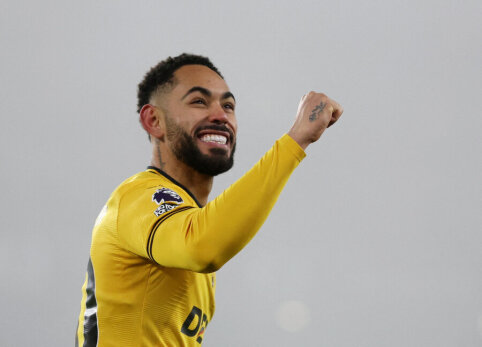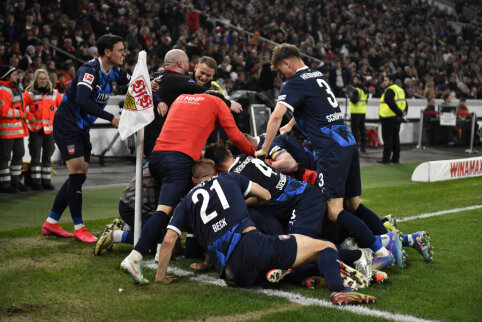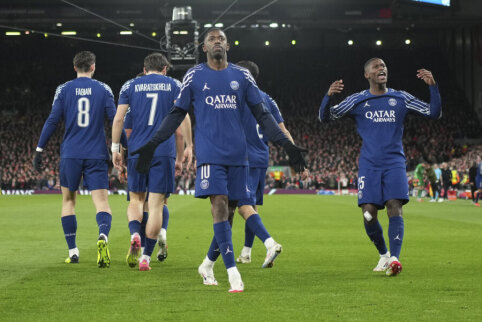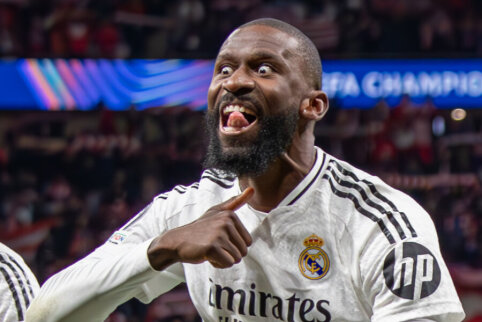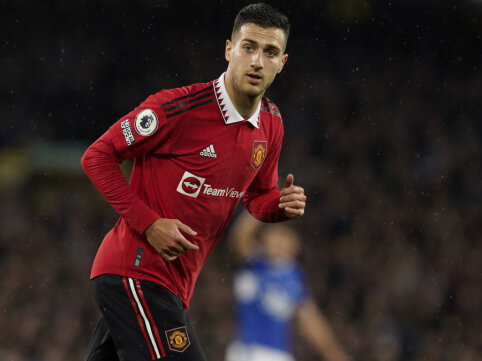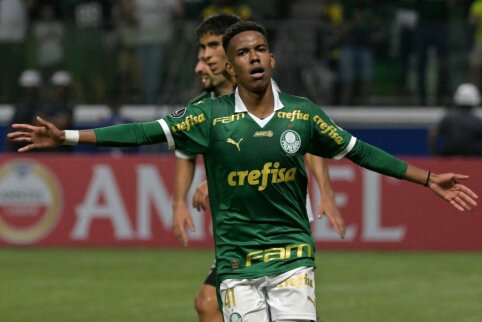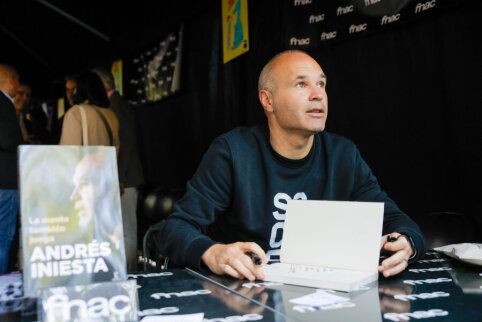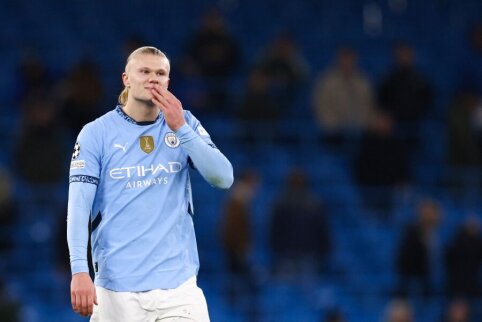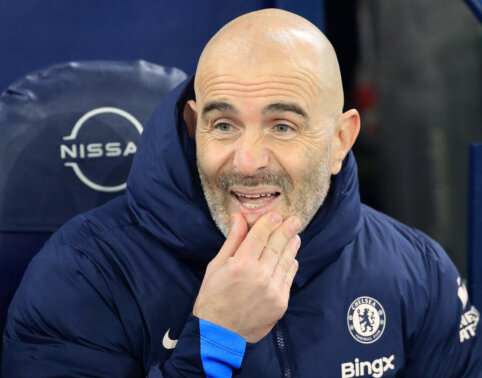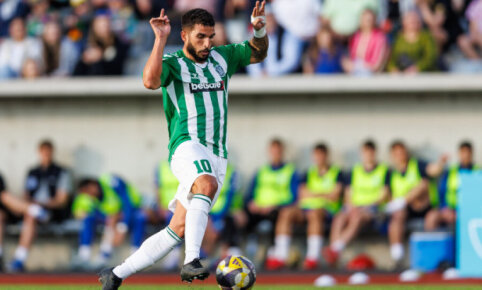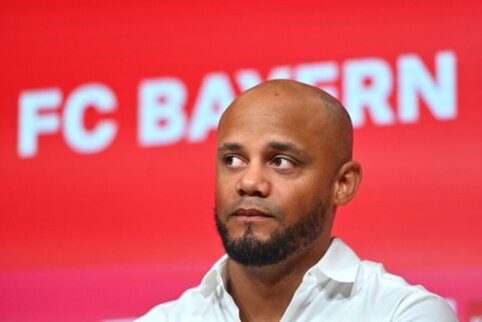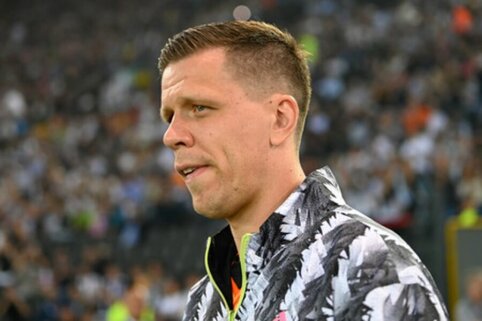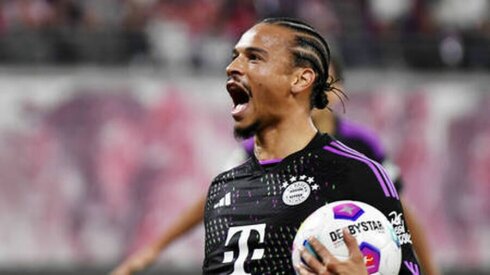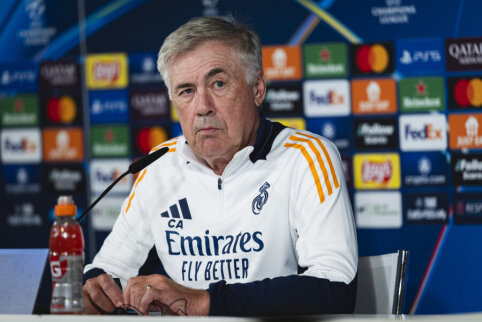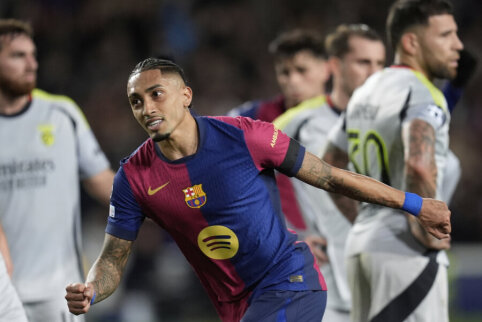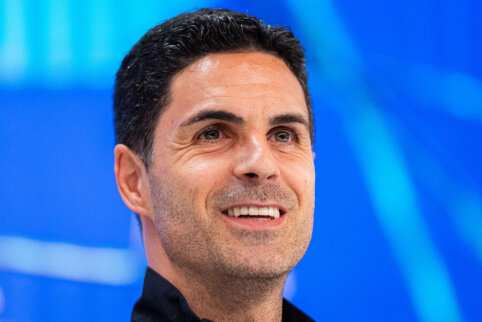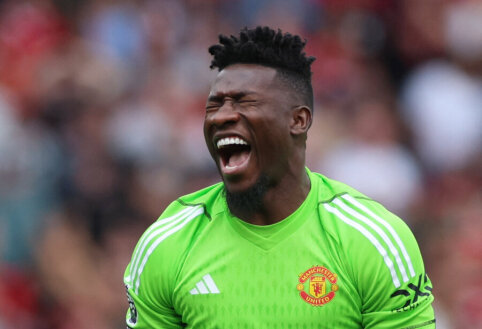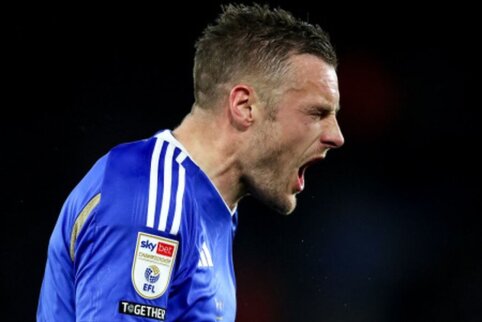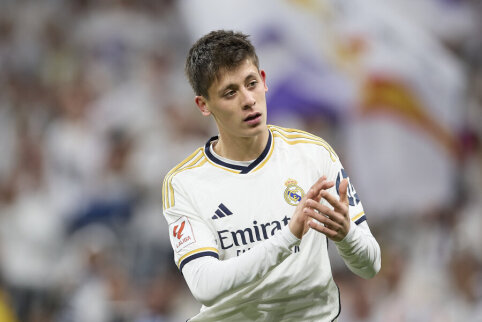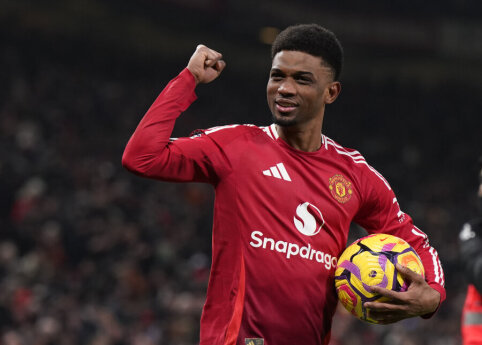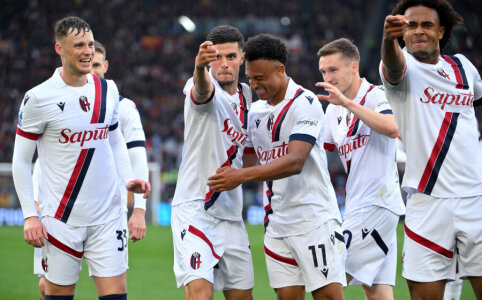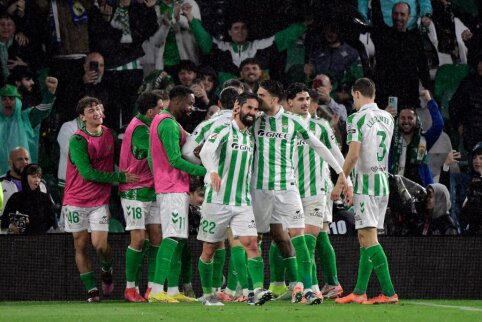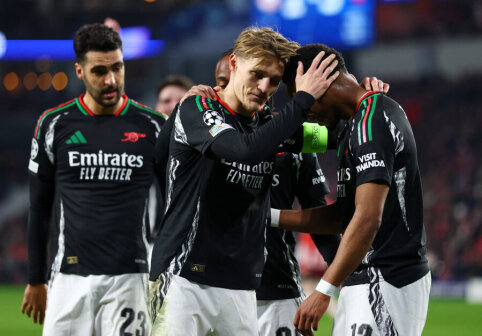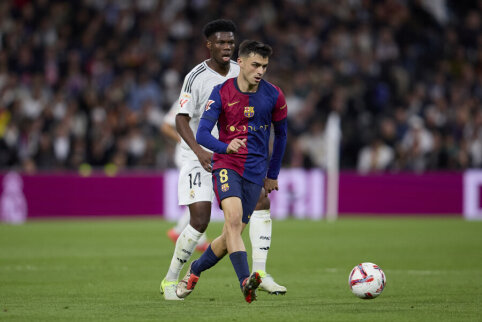 © EuroFootball.com
© EuroFootball.com
In the section "Tribune" of EuroFootball.com, we invite you to read an informative article about one of the most famous and popular clubs in the world - "Manchester United." Starting with the basic information, it then describes the colorful history of the club, which was full of ups and downs, tragedies, and memorable triumphs. Probably few people know that one of the most titled clubs in the previous century spent several seasons in the Second Division... The club was founded in 1878, although some consider its founding date to be 1902 when it acquired its current name, which sounds in full like this - "Manchester United Football Club." **Colors** The club's main team's kit colors are red and white, occasionally black. In away games, matches are usually played in navy blue kits, occasionally in black and white. Red and white colors have dominated the kit since the beginning of the 20th century. A little earlier, when the club was still called "Newton Heath," the main kit colors were yellow and green. **Titles** - English League Champions – 15 times (1908, 1911, 1952, 1956, 1957, 1965, 1967, 1993, 1994, 1996, 1997, 1999, 2000, 2001, 2003). - Winners of the English Football Association Cup – 11 times (1909, 1948, 1963, 1977, 1983, 1985, 1990, 1994, 1996, 1999, 2004). - Winners of the English League Cup – 2 times (1992, 2006). - Winners of the UEFA Champions League – 2 times (1968, 1999). - Winners of the UEFA Cup Winners' Cup – 1 time (1991). - Winners of the Intercontinental Cup – 1 time (1999). - Winners of the UEFA Super Cup – 1 time (1991). - Winners of the English Football Association "Community Shield" – 15 times (1908, 1911, 1952, 1956, 1957, 1965, 1967, 1977, 1983, 1990, 1993, 1994, 1996, 1997, 2003). **Manchester** Manchester is located in the north-west of England. It is the third-largest city in England, with a population of 2.547 million people (91.1% white, 5.6% Asian, 1.2% black). Manchester is compared with Amsterdam and St. Petersburg in terms of its landscape and beauty. Another "Premier" League club, Manchester City, is based here. The city is home to the famous music group "Oasis" and is also known as the rainy city - it receives an average of 809 mm of rainfall annually. The famous River Mersey crosses the southern part of the city. **Sponsors** At the end of November 2005, the four-year £36 million sponsorship deal between "Man Utd" and the mobile communications company Vodafone came to an end. Previously, from 1982 to 1999, the team was sponsored by the electronics company Sharp. On April 6 of this year, club president David Gill signed a record £56.5 million sponsorship deal with the company "AIG" for 4 years. "AIG" is the largest American insurance company, founded in 1919 with headquarters in New York. The company employs 97,000 people, with an annual profit of $10.5 billion. **Stadium** "Man Utd" plays their home games at "Old Trafford" stadium. The stadium was built in 1910 in the western part of the city. The architect of the project was Archibald Leitch, who also designed Glasgow's "Hampden Park" stadium. In its first years of operation, "Old Trafford" could accommodate about 80 thousand fans. However, during World War II, the stadium was severely damaged and it took 3 years to rebuild it. At that time, Manchester United used to play at their neighbors' "City" "Maine Road" stadium. However, "Old Trafford" was renovated and regained its charm and significance - the 1966 World Cup and 1996 European Championship games were played there, the 2003 Champions League final was held there, and recently the England national football team has been playing here regularly. The legendary team player Sir Bobby Charlton has named this stadium the "Theatre of Dreams". Currently, "Old Trafford" accommodates 76 thousand spectators, but it is constantly expanding. It is planned that in a few years the stadium will be able to accommodate 92 thousand fans. **Club History** **"Newton Heath"** The foundations of Manchester United were laid in 1878 when a local railway company team founded the football club "Newton Heath LYR" (LYR stood for Lancashire and Yorkshire Railways). Initially, the worker's team competed with other LYR department teams, and after 4 years became members of the Football League. The team did not achieve significant victories, and in 1894, it dropped to the Second Division, where it was usually among the leaders but could not make it to the First Division and often lost to its principal rival, "Manchester City". At the beginning of the 20th century, the team faced a significant financial crisis, and "Newton Heath" found itself on the brink of bankruptcy. The team captain Harry Stafford decided to save the team. He organized a fundraising campaign, and he brought his Bernese Mountain Dog to it. However, it was difficult to collect money, and the dog ran away. Harry later found his dog near John Henry Davies' pub. Both men started talking, and Harry told him about the team's trouble. J. H. Daviesdecided to support "Newton Heath" and save it from bankruptcy. It was decided to also change the name. And so in 1902, rejecting the "Manchester Central" and "Manchester Celtic" options, "Manchester United" was born. **First Steps of "Manchester United"** The team, supported by the new owner with a new name, returned to the First Division in 1906 and even won it in 1908. That same year, they also won the "Community Shield" and a year later, they won the FA Cup by beating "Bristol City" 1-0 in the final. Seeing the progress of the team, J. H. Davies thought that they needed a big stadium. And in 1908, under the guidance of architect Archibald Leitch and financed by Davies, construction began on "Old Trafford" on land owned by him.... The stadium was built in just 2 years. On February 19, 1910, Manchester Utd played their first match at "Old Trafford" against Liverpool. United lost 3-4, and the match was attended by 80 thousand spectators. In 1911, the team won its second English champions title. Before World War II, United, having taken over the coach Robson unsuccessfully, dropped to the Second Division. However, immediately after the war, they were back in the First Division. During the wartime, only two players stayed on the team. **The Munich Tragedy** On February 6th, 1958, a winter day, the plane carrying the Manchester United team back from Belgrade landed in Munich to refuel. With 38 people on board, after a brief wait, the plane was ready to take off again. Unfortunately, the airport was covered in slush. At 2:15 PM, the plane started moving, but due to problems with the left engine, the pilots had to abort takeoff twice to return to the box and check the engine. After confirming everything was in order, they were given permission to take off at 3 PM due to slush and melting snow on the runway. The "Ambassador" took off quite slowly. When it reached a speed of 185 km/hr, the plane's nose lifted too much, but the rear wheels couldn't lift off from the heavy snow, and the frozen wings lost their efficiency. The helplessness of the plane trying to take off skidded along the ground until it eventually crashed into a building, then another, and hit the ground.... Immediately, seven players of the team (Roger Byrne, Geoff Bent, Mark Jones, David Pegg, Liam Whelan, Eddie Colman, and Tommy Taylor) perished, while Duncan Edwards died in the hospital. Three club employees, eight journalists, two crew members, and two passengers also lost their lives. Due to the accident, ten years later, airport workers in Munich were found guilty as they failed to clear snow from the runway. Bill Foulkes later remembered this moment: "The end of the plane just dropped off. I ran as fast as I could. I ran and ran. Then I turned around and realized the plane wouldn't explode, so I ran back. I saw the plane burning on the road. I started running back. Roger Byrne was strapped to his seat, Bobby Charlton lay still in another seat. Then Harry Gregg appeared, and we began to search for those who could still be helped. Two club members helped Matt Busby, who was injured, then Bobby Charlton recovered and joined the others." The fire was quickly extinguished since the rescue service was nearby. Manchester, upon hearing this news, went through great grief and depression. It was thought that Manchester United wouldn't recover...However, many were mistaken. **Incredible Renaissance** While coach Matt Busby recovered from his injuries in the hospital, assistant coach Jimmy Murphy took over the reins temporary. With him, Manchester United finished 2nd in the league that season and managed to reach the FA Cup final, where they lost to Bolton. The players' motivation and will to fight and recover were immense. When coach Matt Busby resumed his duties, he began to build a solid core around Dennis Viollet, who scored 32 goals in the season following his injury, Nobby Stiles, who survived the tragedy, Bill Foulkes, and Bobby Charlton, and the record signing of Denis Law who joined from Torino for a whopping sum of £115,000. In the 1962-1963 season, a young Northern Irishman named George Best joined the team, later becoming a football superstar. In 1967, Manchester United once again triumphed in the English league, and the following year they stormed Europe. After overcoming "Hibernian", "Sarajevo", "Gornik", and "Real Madrid," the "Red Devils" faced Lisbon's "Benfica" in the UEFA Champions Cup final at Wembley Stadium in London. The game ended 1-1 in regular time, with United saving a penalty kick from Eusebio, allowing them to claim a 4-1 victory in extra time to win their first European trophy, both for themselves and England, just 10 years after the Munich tragedy.... Sir Matt Busby retired following the 1968-1969 season when United finished only 11th in the league. **Lean Years** After the glorious victories, it is often followed by a period of hardships, and so it was for United, as they faced a very challenging phase. After Matt Busby's retirement, the club struggled to find a suitable coach. Neither Wilf McGuinness, nor Frank O'Farrell, nor Tommy Docherty could bring the team back to its winning ways. Moreover, key players began to leave - Denis Law, George Best, and Bobby Charlton. Eventually, the team was relegated to the Second Division in 1974. After one season, they returned to the First Division and in 1977, won the FA Cup by beating Liverpool in the final. Shortly after, due to disagreements with the club management, Tommy Docherty was dismissed, and Dave Sexton, his replacement, gradually brought stability back to the team. The era of transition was finally overcome. **Stability of the Nineties** In 1981, Ron Atkinson replaced Dave Sexton as coach and set a record £1.5 million to acquire Bryan Robson. For several seasons, Manchester United remained either in third place or at the bottom of the prize list, attempting to find a quality striker akin to Ian Rush of Liverpool, who won the Premiership six times from 1982 to 1984. Although Manchester United won the FA Cup in 1983 and 1985, they missed out on the league title to Liverpool. In 1986, after the departure of Ron Atkinson, who was replaced by legendary Scottish coach Alex Ferguson from Aberdeen, the team did not respond to this change immediately. However, in 1989 and 1990, Ferguson managed to bring the "Devils" to second place in the league and secured a spot in the FA Cup final, where they lost to Everton. In the summer of 1991, the team was reinforced by Paul Ince, Denis Irwin, Roy Keane, Mark Hughes, Ryan Giggs, Peter Schmeichel, Eric Cantona, Gary Neville, Paul Scholes, and others.... By 1991, Manchester United had won the UEFA Cup Winners' Cup, beating Barcelona in the final in Rotterdam 2-1, with both goals coming from Mark Hughes, who had previously played for the Catalan club. In 1993, Manchester United finally, after 26 years, won the Premier League. In 1994, the "Red Devils" won their first double– the Premier League and the FA Cup. The season of 1994-1995 saw Manchester United playing against "Crystal Palace," and after losing Eric Cantona due to his altercation with fans, they missed out on winning any titles, losing the league title to "Blackburn" by just one point and the FA Cup final to "Everton." In 1996, with Cantona back in the squad, Manchester United once again accomplished the double, winning the FA Cup final against "Liverpool" and subsequently won the Premier League in 1997. Following that season, the club purchased David Beckham after a string of successful years. Beckham's departure to Real Madrid this season was followed by Cristiano Ronaldo joining the team. In 1999, after an inspiring season winning the Premier League ahead of schedule, Manchester United secured their first Champions League title by beating Valencia 2-1. After this season, manager Alex Ferguson was knighted, and Manchester United ended the year by winning the FIFA Club World Cup, defeating Palmeiras of Brazil. The year 1999 was written in gold letters in Manchester United's history. In 2000 and 2001, the "Red Devils" once again became Premier League winners, matching the success of Liverpool from 1982 to 1984. In the summer of 2001, Rud van Nistelrooy, a Dutch goal-scoring machine, joined the team. By 2002, the club saw no titles. Rumors of Ferguson's retirement surfaced, but he would later change his mind. In 2003, Manchester United became the strongest team in the English league again. In that season, playing against teams like "Newcastle" (6:2 and 5:0) and "Liverpool" (4:0), the Manchester United players scored an impressive total of 26 goals in the last 8 games to beat "Arsenal" to the title. Following the season, David Beckham moved to Real Madrid, replaced by Cristiano Ronaldo. In 2004, Manchester United won the FA Cup for the 11th time, defeating "Millwall" 3-0 in the final. That same year, the team was bolstered by the talented 18-year-old forward, Wayne Rooney. Unfortunately, the following season was without titles. It seemed not surprising since the club owners changed. In the midst of these events, Manchester United lost the FA Cup final in a penalty shootout against "Arsenal." "Love United, hate Glazer." The Manchester United board of directors, resisting one American, media magnate Rupert Murdoch's intentions to acquire the club, did not resist another American, Malcolm Glazer, who also owned the American football team, the Tampa Bay Buccaneers. Malcolm Glazer took his first step in March 2003 when he acquired 2.9% of the club's shares. Over the next 19 months, his share increased to a significant 28.1%. Glazer then decided to become the primary owner of the club and made an offer to Irish Companions McManus and Magnier to buy their stake, which was 28.7%. The first two Glazer offers were rejected, but for the third one, worth £227 million, the Irish companions agreed. McManus and Magnier calculated that they would earn around £90 million in net profit and agreed to sell their share. In the spring of 2005, Glazer became the primary owner of the football club. By the end of June 2005, the Glazer family controlled over 98% of the club's shares. Glazer, a top shopping center magnate and investor in various projects, has assets valued at $1.1 billion, while the club cost him about £790 million to acquire. In reality, he only invested £270 million, and the additional £520 million was borrowed from banks. It has been calculated that the interest on this sum amounts to £126,000 a day! This American placed such a burden of debt on one of the most popular and profitable clubs worldwide, causing Manchester United's executive director, David Gill, to enforce a financial transfer policy, leading to higher ticket prices for home games. Clearly, these occurrences prompted a massive protest from Manchester United fans, leading to various actions against the Glazer family's policies. Even today, the Glazers cannot feel safe in Manchester. The slogan "love United, hate Glazer" has become quite popular. The group of the most dissatisfied fans founded the alternative football club "FC United of Manchester," which currently competes in the ninth-tier English football league. The next season awaits the Glazer family with even more tension. The most ardent fans are determined to drive the American out at all costs. Perhaps only victories would allow Glazer to dampen the anger of his opponents.... "Manchester United" Records - Biggest league win – 9-1 against "Ipswich," 1995. - Biggest European win – 10-0 against "Anderlecht," 1956. - Highest league defeat – 0-7 against "Blackburn," 1926. - Most spectators in a home match – 83,250 in the 1948 match against "Arsenal." - Longest unbeaten streak – 45 games – from 1998.12.24 to 1999.10.03. - Most appearances for the team – 754 by Bobby Charlton. - Most goals for the team – 247 by Bobby Charlton. - Most goals in a season – 46 by Denis Law, 1963-1964. - Fastest goal – just 15 seconds by Ryan Giggs against "Southampton," 1995. - Most consecutive goals – 10 matches by Ruud van Nistelrooy, from 2003.03.22 to 2003.08.23. - Most goals scored in a season – 103 – in 1956-1957 and 1958-1959. - Most goals in European tournaments – 38 by Ruud van Nistelrooy. - Most appearances in a row – 129 by Peter Schmeichel. - Gretest Football
